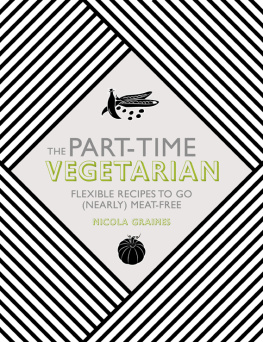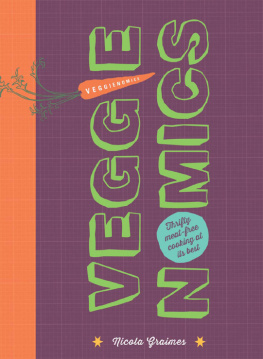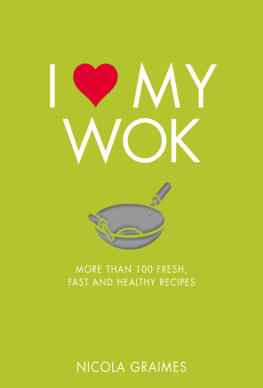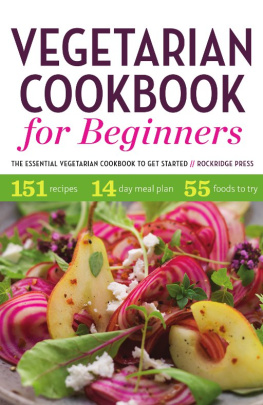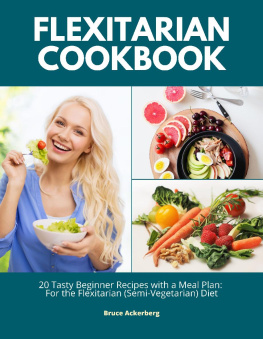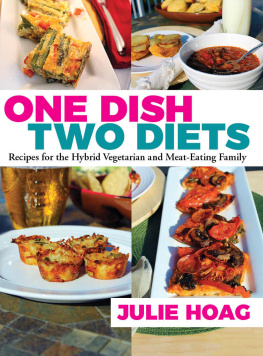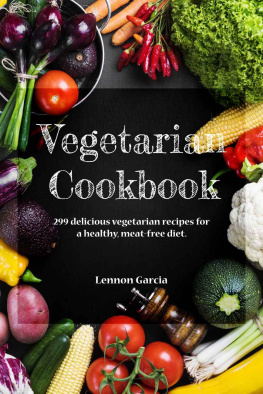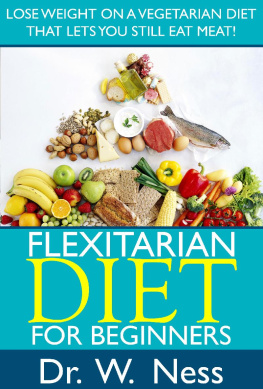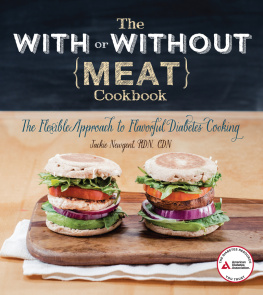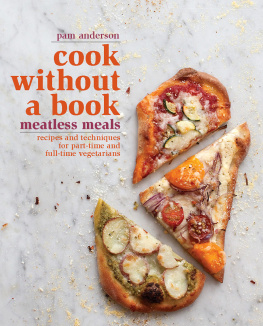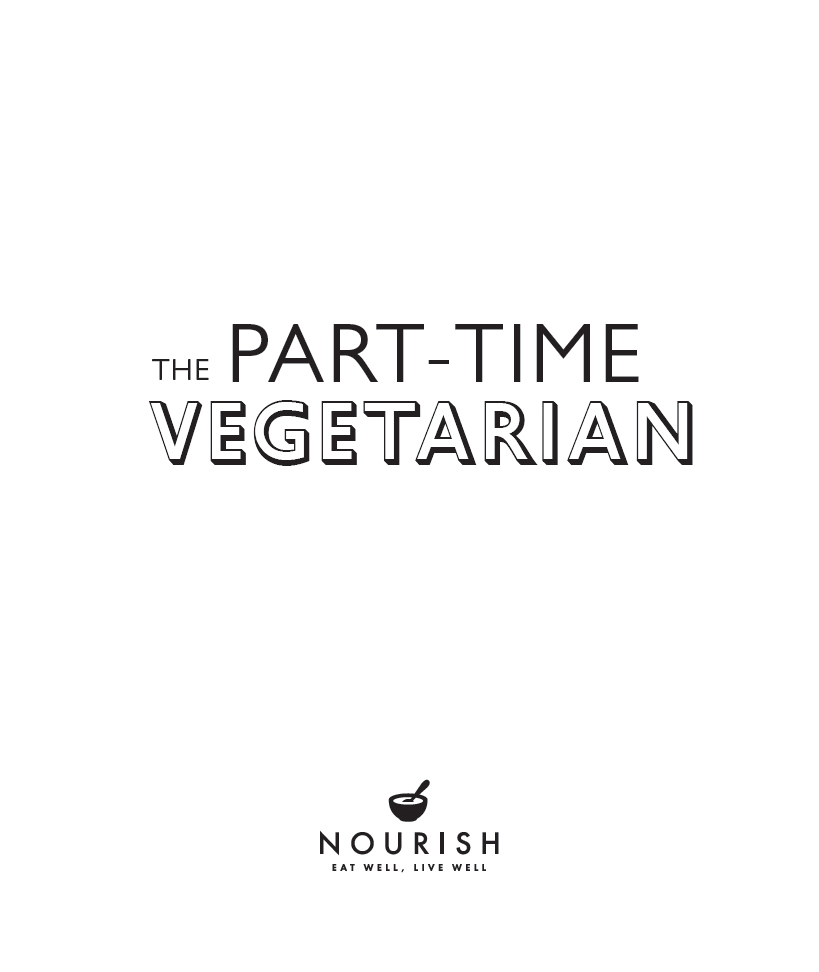
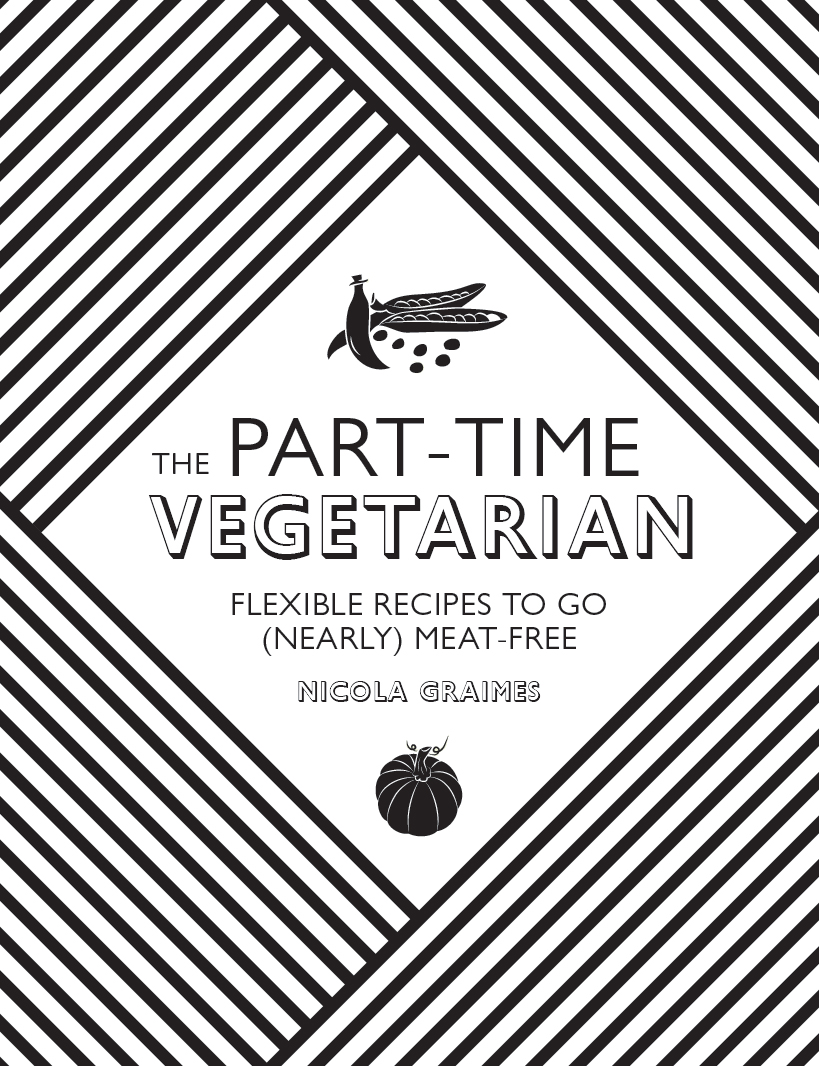
CONTENTS
Introduction
Its time to make a confession: writing this book is a bit of a coming out for me. Having been vegetarian for nearly thirty years, Ive started including a small amount of meat and fish in my diet. This change of heart and eating habits has come about due to various reasons and really wasnt taken lightly. Yet Ive discovered that Im not alone as the number of what I suppose could be called part-time vegetarians is growing exponentially on a yearly basis. A study by the American Journal of Clinical Nutrition found that nearly two out of three vegetarians occasionally like to eat meat, chicken or fish.
There is also a significant rise in the number of non-vegetarians who eat meat-free meals on a regular basis. Until relatively recently, many non-vegetarians would have scoffed at the idea of deliberately choosing to eat vegetable-based meals several times a week, but there has been an impressive positive shift in many of our eating habits and part of this is cutting down on the amount of meat we eat.
Its fantastic that many of us are becoming more conscious of what we eat and where our food comes from. Its all a bit clichd, but vegetarian food has come a long way since the lentil days not that there is anything wrong with lentils! But while in the past it may have sometimes been seen as a little too worthy, vegetarian cooking is now exciting, inventive and inspirational. There has been an explosion of different ingredients available from all corners of the globe, while many restaurants not just vegetarian ones and numerous cookery writers and food bloggers have fuelled the growing interest in what they are calling flexitarianism or flexible eating.
COMMON FACTORS
So what is a flexitarian diet and why should we be interested?
Just like vegetarians, part-time vegetarians or flexitarians prefer to base meals on vegetables. Whether this is for health, economic or moral reasons (or more likely a combination of all three), the fact is that the flexitarian diet one that is largely vegetarian, but occasionally includes poultry, meat and seafood is growing in popularity and is a long-term trend thats gaining momentum.
Since we have all become more thrifty and price-conscious when food shopping, and vegetables on the whole are a lot cheaper than meat and fish, the part-time vegetarian diet seems to be the logical way to go for non-vegetarians. Good-quality meat and fish have become prohibitively expensive, so it makes sense to eat them less often so you can still choose the best quality and ethically sourced.
In the eyes of food scientists, our current consumption of meat and fish cannot be sustained in the long-term. It is far more ecologically sound to eat more vegetables, which are much less intrusive on the earths resources than meat products.
Whats more, the numerous health benefits of a vegetarian diet are well documented and have become more poignant due to various health scares that have blighted some areas of food production in recent years. All these factors mark a shift towards a vegetable-based diet or a meat-light one.
As the name suggests, the beauty of this diet is its flexibility. Unlike most diets its not prescriptive there are no hard-and-fast rules so it can easily be adapted to suit your lifestyle and whats happening on a weekly basis. Whether you opt to go meat-free just one day a week, eat meat on rare occasions or prefer to choose meat- and fish-light meals, The Part-time Vegetarian allows you that flexibility. The book is also perfect for those who are fully fledged vegetarians, or who have a non-meat eater in the family or coming for dinner, and are looking for new ideas and adaptable recipes that dont rely on meat substitutes.
In other words, The Part-time Vegetarian cookbook is for those looking for simple, nourishing, cost-effective meals and an environmentally intelligent way to eat. Flexitarians are taking a positive step forward when it comes to their health, the environment and animals.
WHY GO FLEXITARIAN?
There are many motivations for going flexitarian. The ultimate goal may or may not be to become vegetarian or vegan in time, but there are lots of reasons to make positive changes to your diet by reducing the amount of meat you eat.
HEALTH: numerous studies point to the positive health benefits of a plant-based diet, particularly in reducing the risk of chronic illnesses such as heart disease, certain types of cancer, high blood pressure and obesity.
ANIMAL WELFARE: scandals relating to the farming of animals and processing has made us nervous and suspicious of what were actually buying. As well as cutting back on meat, a positive change flexitarians can make is to look for meat that has been ethically reared to a high standard of animal welfare. Choose free-range, organic and locally reared, if possible, and give a plant-based diet greater priority.
ENVIRONMENT: studies estimate that an affluent diet containing significant amounts of meat requires up to three times as many resources as a vegetarian diet. One of the simplest changes we can make is to buy locally and eat seasonally. If produced locally, food has less impact on the environment, thanks to reduced energy use and associated CO2 emissions. Buying seasonal fruit and vegetables is also a good way to support the local economy and farming communities.
About this book
Vegetarian food has moved on It has progressed in inspirational leaps and bounds away from stodgy, worthy and dairy-laden dishes to bright, fresh, interesting meals full of flavour, texture and colour. Theres been a real shift in enthusiasm for meat-free cooking and a growing willingness by cooks to experiment with new ways of preparing and presenting vegetables and other vegetarian ingredients. It wasnt long ago that many top-name chefs would openly dismiss vegetarian food as unworthy of recognition how things change.
Consequently, The Part-time Vegetarian is a celebration of vegetarian food with well over 120 simple and nourishing recipes that take you from Breakfasts and Brunches; Light Meals, ideal for lunches or snacks; quick and easy Weekday Suppers; Weekend Cooking for when time is not so pressing; to Food for Sharing, covering dishes for entertaining, celebrations and special occasions.
But theres more.... perhaps refreshingly, our eating habits are not often easy to pigeonhole, so the idea behind The Part-time Vegetarian was born out of the growing trend in flexitarianism, primarily a plant-based diet with the occasional addition of meat or seafood. In keeping with those who do not want to commit to a fully vegetarian diet, choosing a more flexible way of eating instead, many of the recipes in this book can readily be adapted to include meat, poultry or seafood. However, rather than taking centre stage, they are not the main focus of the recipes, which value the impressive range of vegetables, grains, legumes, nuts, eggs and dairy foods instead.
In the book, youll find that many of the vegetarian recipes have a Part-time Variation at the end, a twist that means you have effectively two recipes in one. Sometimes the variation is as simple as a token sprinkling of crispy bacon on the finished dish, at other times its a more substantial addition. Though having said that, the recipes remain intentionally meat- or seafood-light throughout. The Part-time Variations add a new dimension to the vegetarian recipes and consequently widen and extend the home cooks repertoire of dishes. For instance, the Udon Noodle Broth (see ), there is spiced grilled lamb. A change in the main ingredient sometimes calls for a slight switch in spicing or use of other flavourings, and it is these minor alterations that can take a dish and turn it into something quite different.

